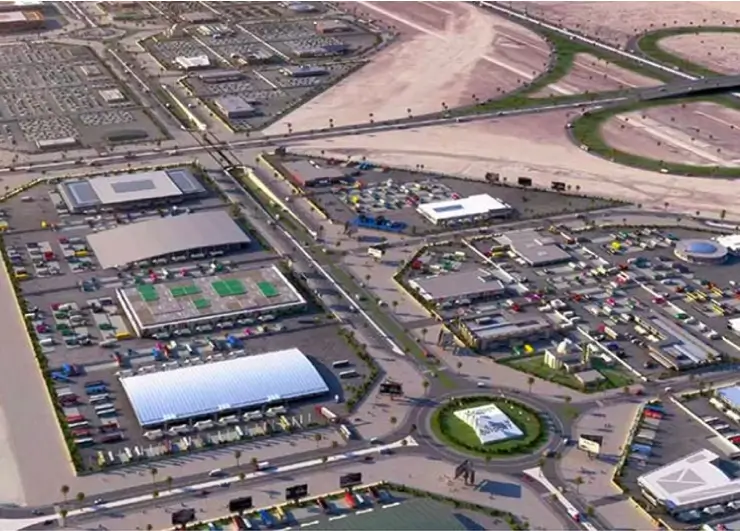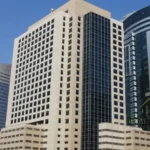Abu Dhabi is recognized worldwide as a city of growth and ambition, playing an integral part in shaping the vision of Abu Dhabi for the future. Amid the numerous strategic initiatives that include it the industrial City of Abu Dhabi (ICAD) stands out as an outstanding example of development, economic diversification as well as sustainable development. It is positioned as a major driver of the country’s industrial development, ICAD is transforming Abu Dhabi into a flourishing industrial center while setting the bar for other cities around the world.
This blog will offer an extensive overview of ICAD and its infrastructure, its role in diversification, and sustainability in workforce development, as well as its importance on a global level.
What is the Industrial City of Abu Dhabi (ICAD)?
The Industrial City of Abu Dhabi (ICAD) is a specialized industrial zone that was created to draw investment, boost industries, and help advance the UAE’s economic plan. The project was initiated through the Abu Dhabi Department of Economic Development (ADDED). Abu Dhabi Department of Economic Development (ADDED), ICAD represents the emirate’s determination to diversify its economic dependence on oil.
Presently, it covers an area of 40 sq km, ICAD offers world-class infrastructure, strategically designed clusters, and opportunities in industries like logistics, manufacturing, and the latest technology. Its role in Abu Dhabi’s GDP highlights its role in the growth of the UAE.
Key Statistics About ICAD:
- The Total Area: is 40+ square kilometers split into zones of specialized.
- Industries hosted: Metal fabrication pharmaceuticals, plastics, and many more.
- Investors attracted: millions of dirhams via direct foreign investment.
Strategic Location and World-Class Infrastructure
The location of ICAD is among its biggest advantages. It is located near major logistic and transportation hubs which allows for the highest connectivity to the world’s supply chain.
- Proximity to Khalifa Port as well as Abu Dhabi International Airport ensures the smoothest export and import processes.
- Access to major highways facilitates the speedy transport of goods throughout the UAE and the greater GCC region.
- Built with the latest technology, ICAD supports high-capacity manufacturing using water and power systems, integrated logistics, and the latest technology.
Due to the location and the infrastructure, ICAD is ideal for companies looking to expand their operations in areas like Middle Eastern, European, and Asian markets.
Key Sectors and Industries in ICAD
ICAD has a variety of industrial clusters, each of which focuses on specific industries. The most important sectors are:
Manufacturing
ICAD is now an industrial hub with modern manufacturing processes that produce everything from large machinery to consumer items. Businesses benefit from lower operating costs as well as robust support systems.
Aerospace
Abu Dhabi’s commitment to developing cutting-edge technology is evident in the ICAD aerospace cluster. This industry supports the manufacturing of aircraft repairs, maintenance, and repair operations.
Automotive
ICAD draws automotive giants to build facilities for logistical, assembly, and distribution of spare parts in the region.
Pharmaceuticals and Healthcare
Pharmaceutical companies that are focused on R&D drive the development of new products, while high-quality production outputs help support the international and local healthcare supply chains.
Food and Beverages
ICAD is a large-scale food business that leverages Abu Dhabi’s position in ensuring food security for the region.
With companies such as Strata Manufacturing and global logistics companies making their presence felt, ICAD demonstrates its potential to entice and sustain high-tech as well as heavy industries.
Role in Economic Diversification
ICAD is an important element in the Abu Dhabi Economic Vision 2030 which focuses on the transition away from an oil-dependent economy to an environmentally sustainable, knowledge-based economy.
Reducing dependence on oil: Logistics, manufacturing, and IT industries within ICAD generate revenue streams that are not oil-based and increase long-term economic stability.
Promoting innovation: ICAD boasts cutting-edge research and innovation facilities that encourage businesses to embrace Industry 4.0 methods, such as automated processes and AI.
Encouragement of foreign investment: By offering incentives to finance as well as tax-free operations and ready infrastructure, ICAD continuously attracts global investors.
Fostering Sustainability and Green Initiatives
Sustainability is an integral part of ICAD’s work. The city’s industrial sector invests heavily in green technologies, which makes ICAD ideal for eco-conscious growth.
- Renewable Energy: Solar power plants are an essential feature of many industrial locations in ICAD.
- Waste Management: ICAD’s circular economic initiatives promote the recycling of industrial waste to reduce environmental impacts.
- Sustainability Practices: Companies are equipped to comply with global environmental standards, which include energy efficiency programs, as well as green building codes.
A notable example is renewable energy facilities that use solar-powered grids to decrease carbon footprints and align ICAD with global sustainability targets.
Workforce and Talent Development
ICAD not only offers technological advancements but also develops the most skilled workforce needed to support its activities.
- Job Creation: Employment Creation: Thousands of jobs have been created across different sectors which have benefited both Abu Dhabi nationals and expatriates.
- Training Programs for Upskilling: Collaborations with elite education institutions will ensure that students can access the most advanced training and certificates.
- World Talent Hub: ICAD attracts top-tier experts and innovators from all over the globe, making it known as a global hub for talent.
Challenges and Future Prospects
Despite its successes, ICAD faces challenges, including the intense global competition from industrial zones and the need to balance sustainability for the environment and rapid industrialization.
In the future, ICAD plans to expand its reach and make use of innovations regarding artificial intelligence as well as ICT, the Internet of Things (IoT), and robotics. These advances will not just consolidate its standing in the UAE but will also boost ICAD’s global position.
Why is ICAD a Global Model for Industrial Zones?
The Industrial City of Abu Dhabi is a combination of innovative design, top infrastructure, and environmentally sustainable practices, which makes it a model of industrial development.
- Strategic Development focuses on the diversification of economic activities.
- Incorporation of environmentally friendly technology into industrial processes.
- The creation of clusters that are specialized to stimulate industry-specific growth.
Other industrial zones could consider ICAD for information on diversification and sustainability as well as optimizing the workforce.
Conclusion
It is the Industrial City of Abu Dhabi is not just a business hub It’s also a beacon of sustainable development, innovation, and economic growth. With its alignment with its commitment to the UAE Vision 2030, ICAD is vital in transforming Abu Dhabi from a resource-driven economy into a world-class leading player in a variety of sectors.
For global companies and investors seeking new opportunities, ICAD offers an unparalleled environment to succeed while helping the UAE achieve its ambitious goals. This is the right time to discover the endless possibilities of ICAD, the Industrial City of Abu Dhabi.
FAQ’s
1. What is the Industrial City of Abu Dhabi (ICAD)?
ICAD is a specialized industrial zone in Abu Dhabi designed to boost economic diversification, support key industries, and attract both local and international investments.
2. Where is ICAD located?
ICAD is strategically located near key transportation hubs, such as Khalifa Port, Abu Dhabi International Airport, and major highways, ensuring seamless access to global markets.
3. What industries operate in ICAD?
ICAD hosts industries such as aerospace, automotive, manufacturing, pharmaceuticals, food and beverages, and chemicals, among others.
4. How does ICAD support the UAE’s economic goals?
ICAD aligns with the UAE Vision 2030 by promoting economic diversification, reducing dependency on oil, and fostering innovation in advanced industries.
5. What makes ICAD attractive to investors?
ICAD offers modern infrastructure, tax incentives, streamlined licensing processes, and access to a skilled workforce, making it a prime destination for global investors.
6. Is sustainability a focus in ICAD?
Yes, ICAD integrates renewable energy, waste recycling programs, and green building standards to promote sustainable industrial practices.
7. What employment opportunities does ICAD create?
ICAD has generated thousands of jobs across various industries, providing roles for both UAE nationals and expatriates.
8. Are there training programs available in ICAD?
Yes, ICAD collaborates with educational institutions to offer training and upskilling programs to develop a highly skilled workforce.
9. What is ICAD’s contribution to Abu Dhabi’s economy?
ICAD significantly contributes to Abu Dhabi’s GDP by driving non-oil revenue, attracting foreign investments, and supporting industrial production.
10. Why is ICAD a model for industrial cities?
ICAD stands out for its strategic planning, sector-specific zones, eco-friendly initiatives, and robust infrastructure, setting a global standard for industrial development.
More to Read:
Madinat Al Riyad Abu Dhabi Area Guide
Saadiyat Marina District Abu Dhabi Area Guide
Sas Al Nakhl Village Abu Dhabi Area Guide





